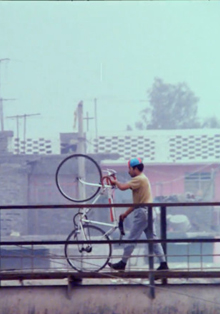On 30 and 31 May, Fundación Casa de México in Spain will offer Días de guardar. Political documentaries of the 1970s in Mexico, a cycle that portrays a subversive period of social, political and artistic movements.
This film, with a great deal of depth, talks about unrecoverable dreams and disenchantment with the promised new modernity. The six films that make up this exhibition, whose title refers to the book of essays by the Mexican writer Carlos Monsiváis, are presented grouped in two programmes: the first revolves around the various social changes that took place in Mexico during the 1970s -including political and militant films of the time shot in Super 8- while the second focuses on the Mexican modernity of the time, which brought with it consumerist disenchantment and the rise of brutalist architecture. Curated by Karina Solórzano, writer, film critic and programmer of the UNAM International Film Festival.
The day of 30 May begins with the screening of Vida de ángel (1982), by Ángeles Necochea, a documentary that brings together the testimony of different women of different ages on domestic work, marriage and gender roles. It continues with the short film Otro país (1972), by the Cooperativa de Cine Marginal, which tells the story of resistance to the regime in the city of Monterrey, in the state of Nuevo León. The programme closes with the film Víctor Ibarra Cruz (1971) by Eduardo Carrasco Zanini, an important example of militant cinema in Super 8, which tells the story of the life of a scrap metal dealer in Mexico City and his dog, his only companion.
The following day, 31 May, the cycle proposes a journey from the culture of the Tarahumara Indians to the megalopolis of Mexico City. Tarahumaras 78 (1979), by Raymonde Carasco, records a meeting in front of a camera with members of this indigenous community. Music, step rhythms, gestures and traditional postures draw the viewer into their traditions. The programme continues with Óscar Menéndez’s La urbe (1976), a visual critique of the often asphyxiating nature of the city, accompanied by drawings by the caricaturist Rogelio Naranjo. The last stop of the show will be Valle de México (1976), by Rubén Gámez, a documentary that presents a collage of images about the overpopulation, pollution and excessive growth of the great Mexican city.







